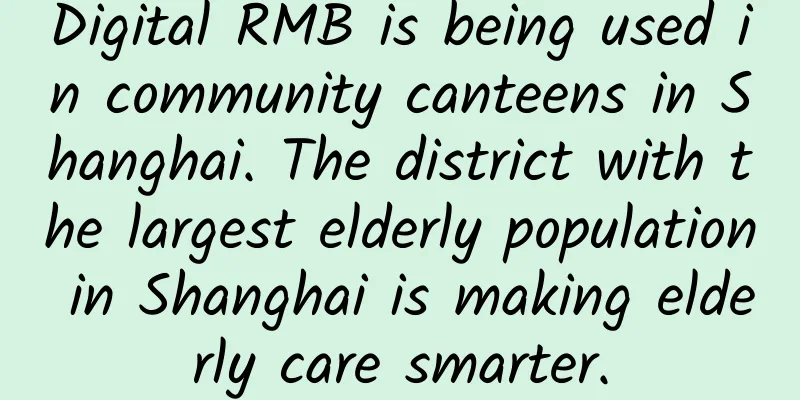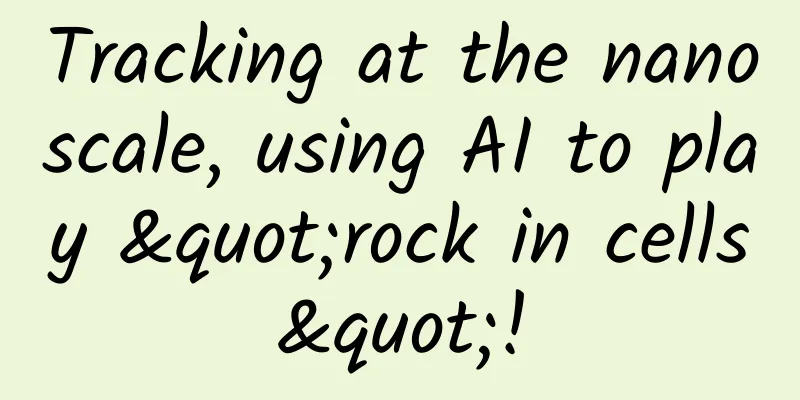Digital RMB is being used in community canteens in Shanghai. The district with the largest elderly population in Shanghai is making elderly care smarter.

|
Braised pork ribs for 15 yuan, fried kelp shreds for 5 yuan... Yesterday at noon, Aunt Gu Xiufang, who lives in Meiyuan Village 3, came to the Lujiazui Community Elderly Canteen at her doorstep. After ordering the dishes and holding the tray, when she came to the checkout counter to pay, Aunt Gu found that there was a "new thing" here: no need to take out the wallet to get the banknotes, just scan the digital RMB on the phone to "pay the bill". It turned out that Lujiazui Street and the Bank of China have piloted the upgrade of the community canteen payment model, which is also the first digital RMB community elderly canteen application scenario in Shanghai. The digital transformation of the city is a popular project that Shanghai is currently promoting with all its strength. In this process, the elderly population must not be left behind. Pudong is not only a pioneer area of reform and opening up, but also the area with the largest total number of elderly people in Shanghai. By using digital means, elderly care has become smarter and more scientific. A set of "Pudong samples" of elderly care in large cities is being formed here for reference and promotion. "Digital Canteen" provides convenience for eatingBefore 11 a.m., many elderly people had already lined up to eat at the Lujiazui Community Elderly Canteen. Many of them brought lunch boxes with them. They not only came here to eat lunch, but also planned to pack dinner to take home. Since each bowl in the canteen is equipped with a dedicated chip, after the elderly have taken their meals, they can put the plates on the smart settlement counter, and the total price of the food on the plates will be directly calculated. The canteen's smart settlement counter is also connected to the face-scanning payment terminal, and the elderly can easily complete the payment settlement by just scanning their faces.
In addition to face scanning, Alipay, meal card swiping, and cash payment, diners here can now choose to use digital RMB. Diners can easily complete the payment by downloading the relevant program on their mobile phones and scanning the QR code. "Unlike third-party trading platforms such as Alipay, digital RMB is not affected by the network and can be easily and conveniently paid. After the transaction is completed, the digital currency will arrive at the merchant's public wallet immediately. Merchants can query the digital currency transaction details through the public wallet website, and set the exchange time by themselves, and automatically exchange the digital currency into the merchant's bank account. There is no handling fee for the entire transaction." The relevant person in charge told reporters that it not only brings convenience to the elderly in payment, but also allows merchants to feel the benefits brought by payment innovation.
What is even more convenient for the elderly is that, with the support of digital technology, there is no need to show identity documents. Regardless of the place of household registration, the backend system can automatically give a 10% discount on meals for the elderly over 60 years old and an 15% discount on meals for the elderly over 75 years old. For the elderly with special identification in the streets, such as those on low-income minimum living allowances, special hardship support, preferential treatment, and severely disabled and unemployed, 5 yuan can be directly deducted from the meal fee. "The elderly can enjoy visible benefits, and they can have a full and good meal for about 10 yuan." Li Zhiwei, deputy director of Lujiazui Street, said that precise subsidies and contactless payment solve the two major pain points of using physical subsidy cards: the elderly worry about losing the card and the canteen worrying about fraudulent use, allowing the elderly to enjoy the convenience brought by the digital age. "Of course, no matter what payment method is used, the staff of the elderly canteen will patiently help the elderly complete the installation and use of the relevant programs, and the elderly do not have to worry about encountering the 'digital divide'."
Digital transformation not only makes life more convenient for the elderly, but also makes services for the elderly more precise. In the care and concern work for the elderly living alone, Lujiazui Subdistrict has innovatively developed a digital platform for risk classification management of the elderly living alone using the data base of the municipal platform Community Cloud and the district platform Zhizhitong, and has fully covered and managed the 1,444 elderly people living alone in the jurisdiction according to the three types of risk: high, medium, and low. The platform can automatically form a personalized "service package" based on the actual situation of each elderly person living alone, and form a corresponding work list to push to paired volunteers, social workers in charge of the area, and neighborhood secretaries to urge the completion of offline visits and care. Empowering the elderly with dementiaAs the saying goes, people become more and more like children as they get older, especially the elderly with cognitive impairment, who need more meticulous care. Dementia is a series of degenerative brain diseases including Alzheimer's disease. It is like an eraser for the brain, erasing not only memories but also having a huge impact on the daily life and social activities of the elderly with dementia. On the first floor of the New Era Civilization Practice Center of Yangjing Street, Pudong, Shanghai's first community empowerment center for elderly people with dementia has been built. Here, various digital means are helping the elderly with dementia fight the disease.
Walking into the center, people's first impression is that the colors here are very rich and warm. The center is divided into areas with different colors as the background. Dark green represents the memory cafe, red represents the cognitive impairment rehabilitation intervention area, and blue represents the day care center. The different spaces are independent of each other and integrated, helping the elderly with mild cognitive impairment to actively participate in community activities and realize their self-worth. It is worth mentioning that the Memory Cafe here is the first cafe in the country operated by elderly people with dementia. Volunteers here teach the elderly how to grind coffee beans, how to brew coffee, and how to make latte art. When cups of mellow coffee are handed out from the hands of the elderly, everyone will give him or her a thumbs up. At that moment, the elderly smile like a child.
The reporter noticed that the empowerment center is also equipped with many application scenarios for smart elderly care, so that the elderly with dementia can be immersed in intervention training. There is a set of VR equipment here. After the elderly put on VR glasses, they will see a virtual classroom. In this classroom, different elderly people perform various cognitive tests according to different prompts, and the test data will be automatically transmitted to the computer for relevant evaluation. For many elderly people, this set of equipment is more like a toy. The virtual scene inside sometimes turns into a forest, requiring the elderly's eyes to follow the movement of birds. Sometimes it turns into a virtual supermarket or bank. The elderly can carry out various life scene operations such as food purchase, checkout payment, deposit and withdraw money, etc., and unknowingly complete the non-drug intervention treatment of elderly people with dementia. Gu Min, deputy director of Yangjing Sub-district, said that the Elderly Cognitive Impairment Friendly Community Empowerment Center has now connected with a series of professional resources, especially a group of digital technology companies. In the future, it will promote the formulation of the Shanghai Elderly Cognitive Impairment Friendly Community 2.0 standard and create an innovative, benchmark and exemplary one-stop service complex. “Smart Elderly Care Platform” will be launched soonAs of the end of 2020, the registered elderly population aged 60 and above in Pudong District reached 1.0278 million, accounting for 32.9% of the total population. It can be said that Pudong has entered a deeply aging society, with the population showing the characteristics of aging, advanced age and empty nest. Faced with the increasingly accelerated aging situation, Pudong New Area is accelerating the promotion of the national pilot comprehensive reform of the elderly care service industry. Zhou Xiaoping, director of the Pudong New Area Civil Affairs Bureau, said that Pudong currently has more than 120 nursing homes and more than 26,000 nursing beds. Through deepening integration, Pudong's "City Brain" has now formulated 38 governance elements for nursing homes, including 7 elements in two categories of urban governance, namely, venues and equipment; 20 elements in five categories of economic governance, namely, personnel, funds, systems, licenses, and operations; and 5 elements in three categories, namely, petitions and public opinion, emergency assistance for elderly people living alone in the community, and epidemic prevention management. The scope of industry supervision and the boundaries of responsibilities have been clarified. On the platform of "one network for unified management", Pudong's elderly care system has achieved the same direction of government, market, and society, guided by demand. "For example, we have set up intelligent supervision functions on the 'one-network management' platform. Through big data analysis, we can discover various risks in the entire district, such as over-bed occupancy, maintenance of special equipment, nursing staff ratios, rights and interests of the elderly, food licenses, license warnings, and illegal practitioners." Zhou Xiaoping said that Pudong has also installed arc alarms, electronic fences, smoke alarms, food safety warnings, bed leaving alarms and other intelligent functions in major nursing homes, which eliminated some blind spots and weak points in previous supervision, enhanced the self-discipline awareness of institutions, and laid a solid foundation for the refined management of nursing service institutions.
Soon, a mobile phone APP software named "Pulaohui" will be launched. This carefully built "smart elderly care platform" has accumulated all the elderly care resources in Pudong. In the future, Pudong elderly people can check the elderly care service facilities and service items around them by just opening their mobile phones, and can also customize personalized elderly care packages. It is a reliable digital "elderly care consultant" for the elderly. |
<<: Following Apple's footsteps, Google may improve Android privacy settings through three solutions
Recommend
A practical analysis of user growth for educational products!
Starting from the relevant concepts of growth hac...
The information flow targeting is very accurate, so why is the effect still so poor?
Why are information flow ads so popular among adv...
Don’t want to drink milk? Try these “milk substitutes” →
For most people of this generation, the main sour...
Can the Wenchang Tower be placed in the living room? It is best to place it in Wenchang position
In ancient times, there was a star called Wenchan...
Original Tips: Let the Operation Masters Make You Learn - Analysis of Mobile Advertising Cheating Methods and Anti-cheating Strategies
Who is the biggest victim of cheating in the mobi...
Let’s talk about how to operate personal content on the live streaming APP Xiaokaxiu?
How can one operate a product like Xiaokaxiu on h...
How do product managers bypass the iOS sandbox mechanism?
Let me first explain what the iOS sandbox mechani...
Is satisfying needs also death? The life decay cycle and countermeasures of social products!
The Internet has been experiencing a cold winter ...
The wonderful quantum world: exploring the phenomenon of quantum entanglement
In the field of contemporary science, quantum mec...
To be honest, before becoming pets, guinea pigs were actually food...
Many zoos and farms in Japan have a program calle...
What if the US bans it? The world's most profitable non-game app in August: TikTok is unrivaled
[[340819]] As the date of the US government's...
Industrial design always shines; Chinese design leads the trend of home appliances in Europe and America
The change in the iPhone 6's appearance has o...
Troubleshooting and solutions for wild pointer issues in Dewu H5 container
1. Background After the release of Dewu iOS 4.9.x...
Cases + Data | Is the effect of investment in the education industry poor? That’s because you didn’t choose the right channel!
Every year from July to September, when summer va...









